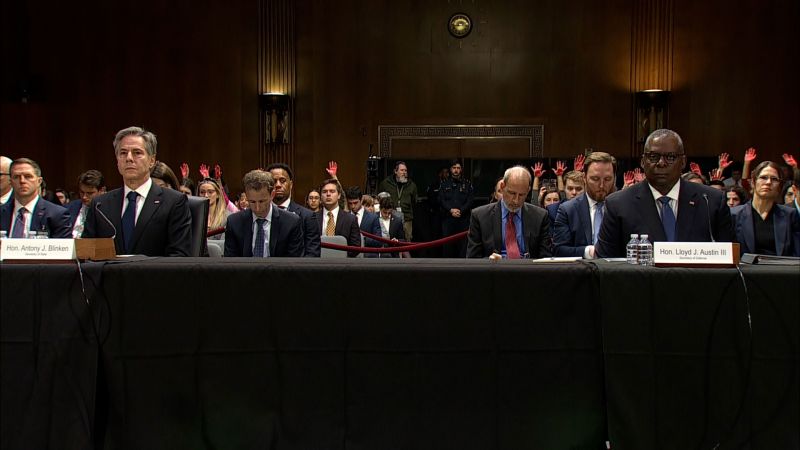US Secretary of State Antony Blinken and Defense Secretary Lloyd Austin on Tuesday pressed lawmakers to urgently pass the Biden administration’s $105 billion national security funding request which includes significant funding for Israel and Ukraine’s war efforts, arguing that the two conflicts are connected and failing to pass the aid together will embolden US adversaries around the world.
They appeared at a Senate Appropriations Committee hearing as the crisis in the Middle East deepens, with the humanitarian situation in Gaza growing even more dire and the civilian death toll mounting amid the Israeli forces’ expanded operations in the strip.
Blinken, Austin and a number of other lawmakers noted the links between the conflicts in the Middle East and Ukraine, with Iran providing Russia with weapons for its war.
“Allowing Russia to prevail with Iran’s support will embolden both Moscow and Tehran,” Blinken said.
“To put it succinctly, for our adversaries, be they states or non-states, this is all one fight and we have to respond in a way that recognizes that. If we start to peel off pieces of this package, they’ll see that, they’ll understand that we are playing whack-a-mole while they cooperate increasingly and pose an ever-greater threat to our security as well as to that of allies and partners,” he added.
“In both Israel and Ukraine, democracies are fighting ruthless foes who are out to annihilate them,” he said. “We will not let Hamas or Putin win. Today’s battles against aggression and terrorism will define global security for years to come. And only firm American leadership can ensure that tyrants, thugs, and terrorists worldwide are not emboldened to commit more aggression and more atrocities,” Austin echoed.
As they pushed for passage of the new aid package, which includes more than $14 billion in additional military assistance for Israel, Blinken and Austin sought to reiterate the US’ support for Israel’s military response while emphasizing their expectation that Israel adhere to the laws of war.
The administration’s request includes $61.4 billion in aid for Ukraine and $14.3 billion in aid for Israel, $9.15 billion in funding for humanitarian aid, $7.4 billion in funding for Taiwan and the Indo-Pacific region and $13.6 billion to address security at the US-Mexico border.
In the Senate, the leaders of both parties have pressed to have any funding for Israel combined with Ukraine and border security funding.
But many Republicans, particularly in the House are opposed to more funding going to Ukraine and on Monday, under the leadership of new Speaker Mike Johnson, House Republicans unveiled a separate $14.3 billion Israel funding bill that included $14.3 billion in funding cuts to the Internal Revenue Service and nothing for Ukraine.
Blinken’s opening remarks at the hearing were quickly interrupted by a series of protesters who shouted for an immediate ceasefire.
“I…hear very much the passions expressed in this room and outside this room,” Blinken said in acknowledgement of the protesters. “All of us are committed to the protection of civilian life. All of us know the suffering that is taking place as we speak. All of us are determined to see it end.”
“But all of us know the imperative of standing up with our allies and partners when they’re security, when their democracies are threatened. That’s what’s happening now. We stand resolutely with them even as we stand resolutely for the protection of innocent civilians,” he said.
The defense secretary spoke of the lessons the US had learned in its own counterterrorism operations that could be applied to Israel’s operations against Hamas, warning that if not done carefully, actions could “create a resistance to your effort that lasts for generations.”
The package contains more than $9 billion in humanitarian assistance for Ukraine, Israel, Gaza and other humanitarian needs.
“Humanitarian assistance is also vital to Israel’s security. Providing immediate aid and protection for Palestinian civilians in the conflict is a necessary foundation for finding partners in Gaza who have a different vision for the future than Hamas – and who are willing to help make it real,” Blinken argued.
“Food, water, medicine, and other essential humanitarian assistance for civilians must be able to flow into Gaza. Civilians must be able to stay out of harm’s way – a task made even more difficult as Hamas uses civilians as human shields. And humanitarian pauses must be considered,” he reiterated.
Much needed aid to civilians in Gaza has only trickled in, with “almost 60” trucks entering daily via the Rafah crossing from Egypt.
Prior to the war, 500 to 800 trucks a day with assistance were entering the strip, Blinken said.
“To date, we don’t have reports either from the UN or from Israel that this assistance has been diverted from its intended recipients but it’s something that we’re going to track very closely,” Blinken said.
“Can I promise you in this committee that there’ll be 100% delivery to the designated recipients? No. There will inevitably be some spillage. We haven’t seen it to date, but I think we have to anticipate that,” he continued.
“But the overwhelming, overwhelming majority of the assistance thus far is getting to people who need it, and we need more,” Blinken said.
CNN’s Haley Britzky and Michael Conte contributed reporting.
Read the full article here





